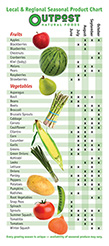The above information will be used only by Outpost Natural Foods for the express purpose of sending an e-newsletter. Outpost shopper information is never shared with other organizations or businesses.
Resources >>
Food Safety
Summer Food Safety
One of the best parts of summer is cooking and eating outside. Along with warmer temperatures comes an increased risk of food-borne illnesses. Follow these guidelines for safe and delicious balmy weather feasts!- Judy Mayer, DTR
Cooking Meat
Source of info: USDA Food Safety & Inspection ServicesThe best way to ensure that meat is cooked thoroughly is to use a thermometer. Insert it halfway into the thickest part of the meat, away from bone, fat and gristle.
If a meat thermometer is not available
- Cook meat until it is brown inside. It is recommended not to eat beef that is pink in the middle.
- Cook poultry until its juices are clear and the meat is white in the middle.
- In order to destroy all harmful bacteria, cook foods until they are completely finished. Do not partially cook meat or poultry to use later.
- Use tongs or a spatula to turn steaks instead of a fork - piercing meat with a fork can contaminate the inside of the meat with bacteria.
- When grilling, you can prevent flare-ups by trimming visible fat off meat and poultry before cooking.
- Don't reuse sauce that was used to marinate raw meat, poultry or seafood unless you reheat it to the boiling point first.
- Use clean plates and utensils when handling cooked meat, poultry and seafood.
Beef, Veal, & Lamb (all cuts)
145 degrees = medium rare
160 degrees = medium
170 degrees = well done
Ground Beef, Veal, & Lamb
160 degrees = well done
Medium rare and medium are not recommended
Ground Turkey & Chicken
165 degrees
Medium rare and medium are not recommended
Whole Chicken or Turkey
180 degrees = well done
Medium rare and medium are not recommended
Poultry Breasts & Roasts
170 degrees = well done
Medium rare and medium are not recommended
Poultry Thighs, Wings and Legs
180 degrees = well done
Medium rare and medium are not recommended
Duck & Goose
180 degrees = well done
Medium rare and medium are not recommended
Pork (all cuts)
160 degrees = medium
170 degrees = well done
Medium rare is not recommended
Hot Dogs & Other Precooked Meats
165 degrees = well done
Medium rare and medium are not recommended
Fish
Opaque and flaky = well done
Medium rare and medium are not recommended
General Food Safety Tips
Before and after preparing foods, wash your handsBe certain to wash hands after using the bathroom, changing diapers or handling pets. Bring water or hand wipes to picnics for cleaning your hands.
Store, handle and prepare foods appropriately to avoid bacterial contamination
Keep foods refrigerated until you're ready to cook them, only removing as much as you can fit on the grill. Going to a barbeque or a picnic? Use a cooler to keep foods cold. Don't over pack the cooler. Purchase enough ice to keep all food chilled - 75% food, 25% ice is ideal. On hot days, cover the cooler with a tarp or a blanket to provide extra insulation and place in a shady area if possible.
Use separate coolers for beverages and perishables
Beverage cooler - People open coolers a lot to grab beverages. Keep the cooler containing meats and other perishables away from warm temps by keeping them separate altogether.
Food cooler
Store raw meat, poultry and seafood at the bottom of the cooler in order to prevent their juices from dripping onto other foods.
When cooking outdoors, find out if there's a safe source of water for food preparation
If not, wash foods at home and store properly. Gallon containers of water can be used for food preparation. Prepare a container of water and bleach to disinfect the work area while you prepare food - 1 teaspoon bleach to 1 gallon of water.
Wash all food prep surfaces before you cook
If possible, use one cutting board for raw meat, poultry and seafood, and another for produce and other foods. Do not use the same plate for raw and cooked meat. Always use different plates, trays and utensils for raw and cooked foods.
Wash fruits and vegetables in cold, drinkable water before cooking, grilling, or eating
Buy fruits and vegetables locally when they are in season. There are usually less pesticides, are more fresh grown close to home and are not shipped long distances. And, remember, even fruits with skins or rinds (like watermelons, cantaloupes or oranges) should be washed - any contaminants on the outside could penetrate into the fruit when cut or onto your hands when eating. Cantaloupe harbors more organisms than other fruits, because of the little ridges in its skin.
Herbs such as basil, oregano, thyme and rosemary offer antimicrobial protection
The next time you make your summer potato salad add a few tablespoons of freshly chopped herbs to ward off the chance of food borne illness!
When in doubt, throw it out!
Has the potato salad languished in the sun? Can't remember when you put that leftover chicken in the fridge? It's better to toss food you're unsure of than to risk getting sick.








